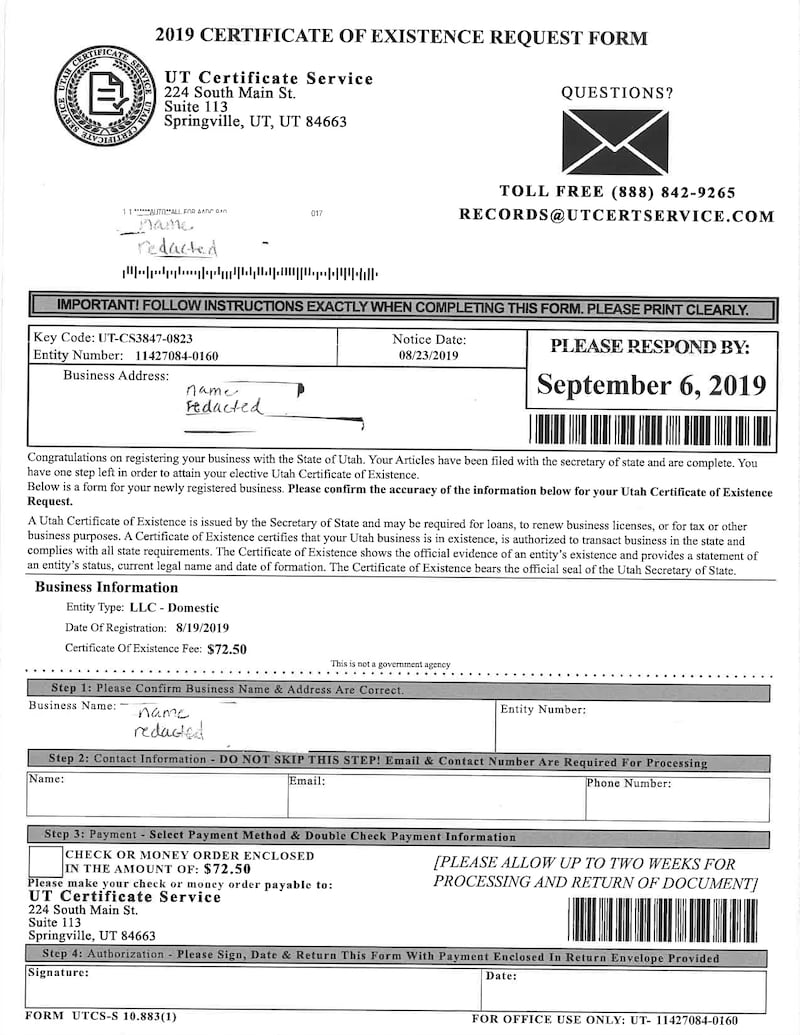SALT LAKE CITY — Some local entrepreneurs are warning their brethren to be on the lookout for a scam targeting Utah business owners.
Recently, Tooele County small-business owner Tamara Wilcox received a letter in the mail urging the recipient to “open immediately” written “in bold and all caps.”
“It said that I owed ($72.50) to get a Certificate of Existence,” she explained. “It was very confusing to me because I knew I had just signed up with the state of Utah (Division of Corporations and Commercial Code) online for a Certificate of Existence.”
Because the letter looked “official” with a seal and traditional messaging, she initially thought it was legitimate.

“What tipped me off was that it was saying I owed $72.50 (for a three-year period) and according to what my friend told me it was $36 for three years,” Wilcox said. Upon contacting the state, she realized that letter was fake.
The state Commerce Department said Wednesday that the Division of Corporations and Commercial Code, and Division of Consumer Protection had received multiple reports that misleading letters are being sent to Utah businesses instructing them to pay $72.50 for a Certificate of Existence with the state that normally costs just $12.
The letter — part of an elaborate scam — is supposedly from “UT Certificate Service,” which does not exist in the state, and then directs companies to a Springville address for payment.
One local business owner was tricked by the official look and nature of the letter.
Emily Davies, of Eagle Mountainhad, received a similar letter not long after registering her photography business with the state.
“It had the state crest on it,” she said. “It looked legit. I thought I was doing the right thing.”
She mailed a cashier’s check for $72.50 in the return envelope provided and soon realized her mistake after contacting the state Commerce Department. Since then, she has been waiting to find out what happened to her payment.
“My cashier’s check has been in limbo,” she said. “They haven’t cashed it.”
Davies said she was contacted by the U.S. Postal Inspection Service, which has been investigating similar cases in other states. This situation has taught her some useful lessons, she noted, and was grateful she didn’t lose more money.
“It could have been a lot worse,” she said. “I thought the letter was from the state. They fooled me, but they won’t do it again.”
State officials warn that while this business practice may be legal, the letters could confuse business owners.
“Utah is the place for business, and unfortunately our state’s economic reputation also attracts those looking to make a buck off the backs of our hard-working business owners,” said Francine Giani, executive director of the state Commerce Department.
Authorities expressed concern that companies might be misled by the language in the letter giving the impression the message is from an actual government entity. State regulators advise the public and business owners that the letters are not sanctioned by the state Division of Corporations and they are not obligated to respond to the notice.
Jason Sterzer, director of the Division of Corporations, said the scammers likely found the contact addresses for the target businesses from a search of publicly available information online.
“Anyone can go onto our online business entity search and look up businesses,” he explained. “It’s public information.”
He noted that owners can search their business name and request their Certificate of Existence at the correct price at Division of Corporations website. The certificates are documents that businesses can obtain to prove they have properly registered with the state to operate, but the certificates are not required, he added.
“A business would not pay $72.50 for a wireless mouse from a third-party seller if they can get the same product direct from the manufacturer for $12,” Sterzer said. “Same is true for our government services at the Division of Corporations. Don’t pay more than what you need to from the correct state government source.”
Businesses that have received the misleading letter and have questions regarding their registration can contact the Division of Corporations and Uniform Commercial Code at (801) 530-4849. Companies or business owners that sent money to the “UT Certificate Service” who would like to file a complaint can do so with the Division of Consumer Protection.


